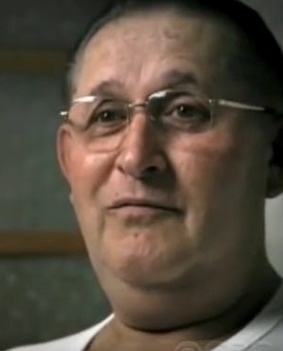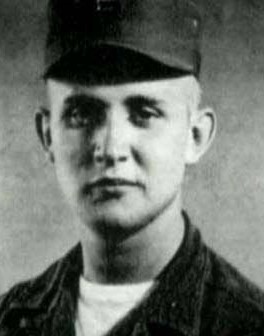James Joseph Dresnok facts for kids
Quick facts for kids
James Joseph Dresnok
|
|
|---|---|

Dresnok in his U.S. Army uniform, prior to his defection
|
|
| Nickname(s) | Jim, Joe, Arthur |
| Born | November 24, 1941 Norfolk, Virginia, U.S. |
| Died | November 2016 (aged 74–75) Pyongyang, North Korea |
| Allegiance | |
| Service/ |
|
| Years of service | 1958–1962 (defected) |
| Rank | Private first class |
| Spouse(s) |
|
| Children | 3 |
| Other work | Teacher, actor, translator |
James Joseph Dresnok (Korean: 제임스 조새프 드레스녹, November 24, 1941 – November 2016) was an American who moved to North Korea and stayed there. He was one of six U.S. soldiers who decided to live in North Korea after the Korean War.
After moving to North Korea, Dresnok became an actor in movies that promoted the North Korean government's ideas. Some of these films were even directed by Kim Jong-il, who was the leader of North Korea at the time. James also worked as an English teacher in Pyongyang, the capital city. He was featured on a TV show called 60 Minutes in 2007. At that time, he was the last American soldier who had moved to North Korea and was still alive there. He was also the main subject of a documentary film called Crossing the Line.
Dresnok often called himself Joe Dresnok. People in the media sometimes called him "James" or "Jim" Dresnok. In North Korea, most people knew him as "Arthur." This was the name of the character he played in a popular TV series called Unsung Heroes (1978).
Contents
Early Life and Joining the Army
James Dresnok was born in Norfolk, Virginia, in 1941. His family faced financial difficulties. At one point, his mother left with James and his younger brother, Joseph Jr., and they had to sleep in their car. Their family eventually found them, and James and his brother went to live with relatives. James lived with an aunt, but he often ran away from her home.
Later, James was placed in a foster home in Glen Allen, Virginia, where he felt more welcome. He decided to leave high school early. The day after his 17th birthday, he joined the United States Army. He believed joining the Army was one of the few good chances he had for his future.
Why He Went to North Korea
James Dresnok's first time serving in the military was for two years in West Germany. After this, he returned to the United States. He then joined the Army again and was sent to South Korea. He was a private first class in the 1st Cavalry Division. His unit was stationed near the Korean Demilitarized Zone, which is the border between North and South Korea.
While in South Korea, James got into trouble with the Army. He had used his sergeant's signature on some papers without permission. This led to him being absent without leave (AWOL), meaning he left his post without permission. He was supposed to face a military court hearing for this.
Feeling hopeless about his situation and not wanting to face punishment, James made a big decision. On August 15, 1962, he ran across a minefield into North Korean territory. He was quickly caught by North Korean soldiers. They took him by train to Pyongyang, the capital of North Korea, where he was questioned.
Life in North Korea
After arriving in North Korea, James Dresnok met Larry Allen Abshier, another American soldier who had also moved there. Eventually, there were four American soldiers living together: Dresnok, Abshier, Jerry Parrish, and Charles Robert Jenkins. The North Korean government used these men in their propaganda films and other efforts to spread their ideas. They appeared on magazine covers and used loudspeakers to try to convince more U.S. soldiers at the border to move to North Korea.
At first, the men did not plan to stay in North Korea forever. In 1966, the four Americans tried to leave North Korea. They went to the Soviet embassy in Pyongyang to ask for help, hoping to move to another country. However, the embassy immediately handed them over to North Korean authorities. After this, James Dresnok decided to make North Korea his home.
Starting in 1978, James Dresnok began acting in several North Korean films. He became famous in the country for his role as an American villain named "Arthur Cockstud" in the TV series Unsung Heroes. Because of this role, his North Korean friends called him "Arthur." He also helped translate some of the writings of North Korean leader Kim Il-sung into English.
One of the other American defectors, Charles Jenkins, wrote in his book that Dresnok was sometimes mean to the other Americans. However, in the documentary Crossing the Line, James Dresnok strongly disagreed with these claims.
During a time when North Korea faced a severe food shortage in the 1990s, James Dresnok said that the government always made sure he received his full food ration. He believed this was because the North Korean leader had a "special concern" for him, and the government promised to take care of him for his entire life.
Family Life in North Korea
James Dresnok was married three times. His first marriage was to Kathleen Ringwood before he moved to North Korea. They divorced after he left the United States.
After moving to North Korea, he married a Romanian woman named Doina Bumbea. They had two sons together: Theodore "Ted" Ricardo Dresnok (born 1980) and James Gabriel Dresnok (born around 1982). Doina Bumbea reportedly died in 1997.
After Doina's death, James Dresnok married his third wife, who was the daughter of a North Korean woman and a diplomat from Togo. They had a son named Tony in 2001. The North Korean government provided James and his family with an apartment in Pyongyang and a monthly payment.
James Dresnok's younger son from his second marriage, James Dresnok Jr., studied at the Pyongyang University of Foreign Studies. His father had taught English there in the 1980s. James Jr. speaks English with a Korean accent and sees himself as Korean. In 2014, he joined the North Korean military. By 2016, he held a rank similar to a captain in the U.S. Army. Both Ted and James Jr. are now married and have their own children in North Korea. Like their father, they have also appeared in North Korean films, often playing American soldiers.
James Dresnok said that he planned to live the rest of his life in North Korea. He stated that no amount of money could convince him to move back to the West. In his later years, he retired and sometimes gave talks in North Korea. He also enjoyed fishing to pass the time.
Death
James Dresnok passed away in November 2016. In August 2017, his sons confirmed that he had died from a stroke. They released a statement saying that their father had told them to remain loyal to Kim Jong-un, the current leader of North Korea.
Filmography
- Unsung Heroes (a.k.a. Nameless Heroes) (1978)
- From 5 p.m. to 5 a.m. (1990)
- Crossing the Line (2006)
See also
 In Spanish: James Joseph Dresnok para niños
In Spanish: James Joseph Dresnok para niños
- Americans in North Korea
- List of American and British defectors in the Korean War
- North Korean defectors
- South Korean defectors
Other Americans who moved to North Korea
- Larry Allen Abshier (1943–1983)
- Jerry Wayne Parrish (1944–1996)
- Charles Robert Jenkins (1940–2017)
- Roy Chung (born c. 1957)
- Joseph T. White (1961–1985)
 | Madam C. J. Walker |
 | Janet Emerson Bashen |
 | Annie Turnbo Malone |
 | Maggie L. Walker |


